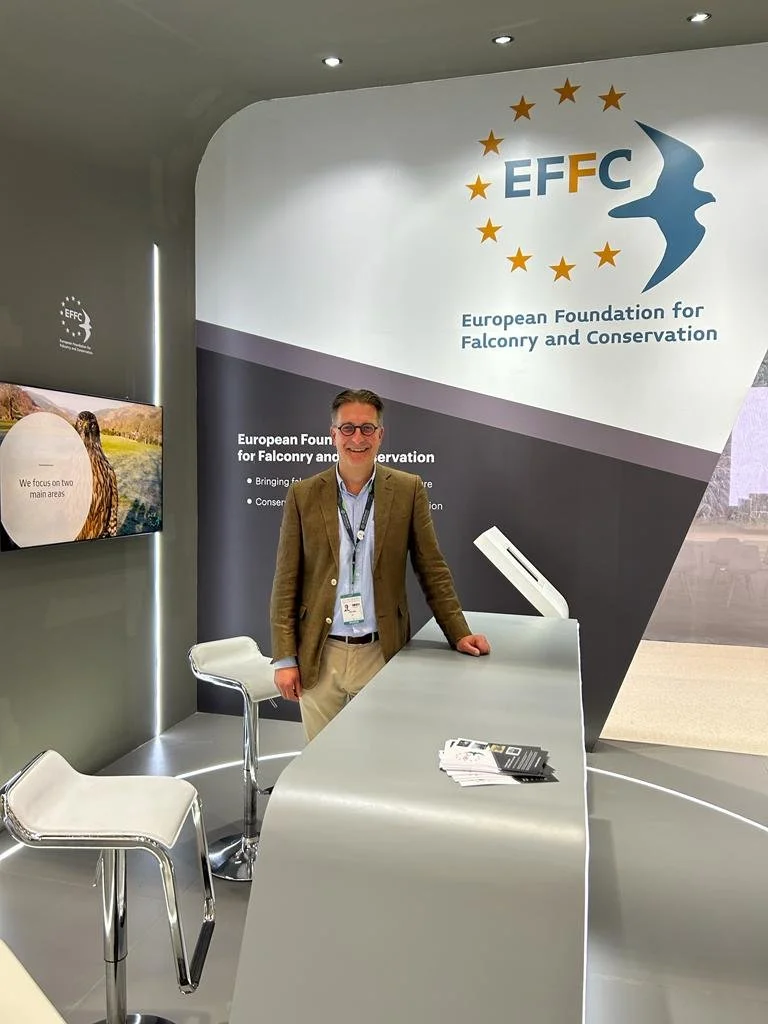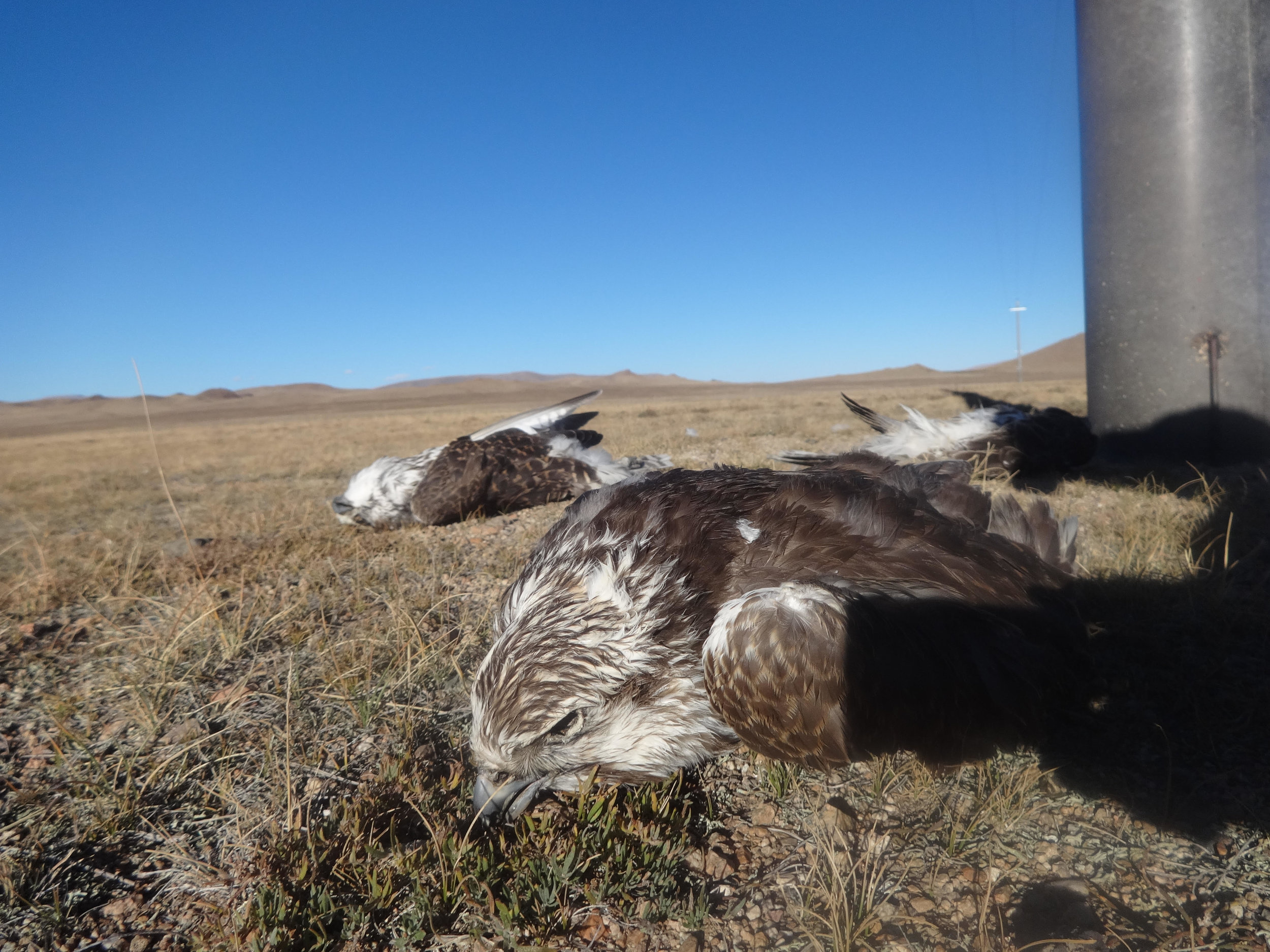News and updates
September 2023
EFFC ATTENDS ADIHEX 2023
EFFC was delighted to take part in this year's International Hunting and Equestrian Exhibition - Abu Dhabi following a generous invitation by Emirates Falconers Club.
The event was most useful in providing us a platform to meet with conservation and cultural organisations to discuss initiatives in which we might potentially be of use. We hope to have some exciting news soon about a new joint project in the works.
Meanwhile, EFFC Secretary Philippe König gave a well-received presentation about the relationship between funding and its impact in conservation.
January 2023
EFFC BECOMES MEMBER OF IUCN
With great satisfaction, the European Foundation for Falconry and Conservation (EFFC) learned that its application to become a member of the International Union for Conservation of Nature (IUCN) has been successful.
As a global network of some 1,400 member organisations across 160 countries, IUCN is one of the largest, most diverse and best resourced conservation bodies on the planet. At a time of unprecedented strain on the natural world, its core ethos of fostering a sustainable relationship between the natural world and human society harmonises with that of EFFC.
Following on from EFFC’s membership of the International Association of Falconry and Conservation of Birds of Prey in January 2021, today’s news is further validation of the activities of an organisation that has accomplished much in its five-year existence.
Speaking after receiving the news, EFFC Chairman Jose Manuel Rodriguez-Villa said: “In our short time, our track record in conservation has been well publicised and clear to see, despite some delays caused by the global pandemic.
“While we are pleased that our efforts have not gone unnoticed by an organisation as large and esteemed as the IUCN, our hope now is that this will strengthen our capacity to ensure falconry’s values and expertise can make a contribution where needed.”
november 2021
EFFC COMPLETES RAPTOR CONSERVATION PROJECT IN SPAIN
FOLLOWING an agreement signed in 2020 between Patrimonio Natural, leading Spanish healthcare company ASISA, and EFFC, work has been successfully completed to prevent powerline electrocutions to some of Europe’s most threatened birds of prey in two regions of Spain.
Dangerous powerlines had been identified in two areas of Ávila Province in Castilla y León, with La Moraña, an area covered in the project, having one of the highest rates for electrocutions. These were having a devastating effect on vulnerable species such as the Spanish imperial Eagle (Aquila adalberti), Red Kite (Milvus milvus), Golden Eagle (Aquila chrysaetos), Great Bustard (Otis tarda), Black Vulture (Aegypius monachus) and Griffon Vulture (Gyps fulvus).
A total of 20 poles have now had corrective measures undertaken as part of these vital works, including nine transformer terminals, seven angle poles, two bypass poles, and two alignment poles.
As part of the project, immediate action was undertaken on an alignment pole located 100m from an Imperial Eagle nest. This was quickly completed in July 2020 just as three youngsters were about to fledge. Disturbance was minimal and all three eaglets and their parents dispersed safely.
EFFC Conservation and Welfare Expert Dr Andrew Dixon said: “Targeted mitigation in this project, like the pole near the breeding Imperial Eagles, is a good example to show that even retrofitting a relatively small number of poles can have a positive benefit for raptors.”
EFFC Chairman José Manuel Rodríguez-Villa said: “Falconers have always played a significant role in conservation, as pioneers, leaders or team players. This project shows us how administrations, private companies and falconers can work together with a shared vision for the sake of species conservation. I want to thank both ASISA and Fundación Patrimonio Natural de Castilla y León for their efforts towards this success.”
October 2021
EFFC was honoured to have recently attended the Abu Dhabi International Hunting and Equestrian Exhibition (ADIHEX).
Held under the patronage of His Highness Sheikh Hamdan Bin Zayed Al Nahyan, Ruler’s Representative of Al Dhafra Region and Chairman of the Emirates Falconers’ Club, this annual event brought together falconers, hunting and equestrian enthusiasts, VVIPS and dignitaries from around the world, all under the theme "Sustainability and Heritage... A Reborn Aspiration".
By kind invitation of event organisers the Emirates Falconers Club, our stand was present alongside other associations involved in falconry and conservation measures related to raptors and their prey species.
We were especially delighted to be visited at our stand on separate days by H.H. Mohamed bin Zayed Al Nahyan, Crown Prince of Abu Dhabi, and H.H. Sheikh Hamdan, both of whom were breifed about the work and vision of EFFC by our Chairman Jose-Manuel Rodriguez-Villa.
Our PRO Hilary White, meanwhile, gave a well-attended workshop at the Sustainability Hub entitled “How Falconry’s values can contribute to modern society”.
September 2021
In its continuing commitment to strengthening falconry’s cultural ties throughout Europe, EFFC in partnership with the Karel Mollen Foundation in the Netherlands is delighted to announce the publication of Karel Mollen: The Last Falconer.
Written by Joke Peels-Mollen and edited By Robert Peels, the book describes the life and work of Karel Mollen and his father Adriaan Mollen, falconer to the king of the Netherlands, covering the period from 1816 to 1935.
For the first time, this publication – sponsored by EFFC – provides an overview of all the art, furniture, tools, letters, and documents that for 180 years have been kept in the Mollen Archive. A century of literary extracts and sources from books and articles tell the rich story of this famous family tied so closely to the historic falconry world capital of Valkenswaard.
For further information or to purchase a copy, visit Coch-y-Bonddu Books.
January 2021
EFFC BECOMES MEMBER OF IAF
It was with great pleasure that EFFC was accepted as a Supporter Member of the International Association for Falconry and Conservation of Birds of Prey.
In a unanimous vote by the IAF Board and Council of Delegates, EFFC’s application was approved at the annual meeting - held online due to Covid 19 - on November 29, 2020.
IAF is an accredited NGO providing advisory services to UNESCO Intangible Cultural Heritage Committee and an accredited member of IUCN International Union for Conservation of Nature. It comprises members from some 90 nations across the world, making it one of the most far-reaching organisations concerned with conservation and sustainability.
Following the decision, EFFC Chairman José Manuel Rodríguez-Villa Matons said: “We believe that it is a most natural affiliation and we certainly look forward to cooperating closely towards our shared vision and objectives.”
May (updated july) 2020
EFFC SIGNS HISTORIC RAPTOR-CONSERVATION AGREEMENT IN SPAIN
An Agreement signed this week between Fundación de Patrimonio Natural, leading Spanish healthcare company ASISA, and EFFC will launch 22 operations to remediate bird mortality caused by power lines in two areas of Ávila Province in Castilla y León, Spain.
EFFC Chairman José Manuel Rodríguez-Villa said: “We are pleased to have reached this agreement with Fundación Patrimonio Natural and ASISA. The target is to remediate electrocutions in several power lines already identified in the province of Ávila. These actions have proven efficient at improving survival ratios in the concerned species, particularly large raptors. EFFC supports projects such as this wherever they are needed in the world.”
La Moraña, an area covered in this agreement, has one of the highest rates for electrocutions because of the proliferation of private power lines that supply irrigation areas. These have a devastating effect on vulnerable species such as the Spanish Imperial Eagle (Aquila adalberti), Red Kite (Milvus milvus), Golden Eagle (Aquila chrysaetos) and Great Bustard (Otis tarda). The other project concerns a 3km power line near the village of Urraca Miguel. Here, electrocutions and collisions over the last number of years have involved many individuals of threatened species, including Black Vulture (Aegypius monachus) and Griffon Vulture (Gyps fulvus).
Regional Minister of Public Works and Environment of Castilla y León, Juan Carlos Suárez-Quiñones, said: “This first agreement will not only allow us to make an important number of actions in Avila’s province aimed at improving power facilities that are causing damage to avian fauna, it also leaves doors open to keep on increasing the collaborations between institutions.”
ASISA President Dr Francisco Ivorra Miralles, meanwhile, added that the agreement chimed with ASISA’s environmental commitments “not only within energy efficiency and emissions reduction, but also for the sake of species and biodiversity conservation”.
Power lines kill thousands of raptors every year, the magnitude of the problem becoming apparent following extensive field work and research by falconers and biologists working in conjunction with the support of Emirates Falconers’ Club and the International Association for Falconry and Conservation of Birds of Prey.
February 2019
Dr Tom Cade (1928-2019)
Ornithologist, Conservationist, Professor, and Falconer
THE world of wildlife conservation, raptor research and falconry is in mourning following the death on February 6 of Tom Cade.
Members of the EFFC Council of Patrons have issued the below statements following the news:
I worked with Tom for over 40 years. Like many brilliant men, Tom was extremely demanding, expecting nothing less than excellence in himself and those around him.
Tom was unique in his ability to unite disparate groups among falconers, government, the conservation community, and industry to create one of the largest and most successful endangered species recovery efforts in history.
Tom Cade was always careful to recognize the important contribution that falconers had made to the successful recovery of the Peregrine Falcon and I can think of no individual in the history of North American falconry that has done more to enhance the public perception of American falconry and its practitioners than Tom Cade.
Jacques Peter Jenny (Past President and CEO of The Peregrine Fund)
Tom Cade was an absolute legend. A scientist and a falconer, he pioneered hands-on conservation techniques that incorporated thousands of years of falconry knowledge. Without him, peregrine falcons would no longer be flying across North American skies, and The Peregrine Fund would not exist. He was an inspiration to both scientists and falconers, and in person was a true gentleman: quiet, patient, generous with his time, and with a wry sense of humour. I will never forget the long conversations I had with him in the early 2000s while in Boise, which showed me again and again that at the heart of his life was that miraculous, beautiful, and astonishingly strong bond he had with raptors, particularly falcons. His work will continue, and he will never be forgotten in the disparate fields and cultures in which he, and his work, made a difference. The world is a colder, smaller place for his passing, but his inspiration lives on.
Helen Macdonald
I am deeply sorry and sad to hear that Tom Cade is no longer with us. He is irreplaceable and his kindness and passion will never be forgotten.
I spent a lot of time with him in Abu Dhabi and visited him many times at the Peregrine Fund in Boise. I have for many years regarded him as a close personal friend and mentor that taught me dedication, consistency, and that sincerity to our goals always guarantees success in conservation. The warmth of his personality allowed me to be part of his thoughts and dreams at times.
His work with the Peregrine Fund, the restoration of the Peregrine Falcon and the inspiration he gave to so many people will endure for a very long time. He will inspire many people all around the globe for years to come. There will be a great emptiness left by Tom’s passing but the strength of his legacy is in the conservation of birds of prey, and especially his willingness to engage with young people and share knowledge with them. May that legacy be honoured in his memory.
I will certainly cherish the time we spent together over the years. I especially remember Tom’s kindness, humanity and great virtue.
To his family, loved ones and friends across the falconry and conservation world, please accept my sincere and heartfelt condolences at this most difficult time.
H.E. Mohammed Ahmed Al Bowardi
August 2018
EFFC contributes to publication of landmark project about falconry’s historical and archaeological heritage.
A new four-volume document has been published that marks the largest project ever concerned with documenting falconry’s historical and historical and archaeological roots.
Raptor and Human: Falconry and Bird Symbolism Throughout the Millennia on a Global Scale contains more than 100 articles from experts around the world. It is edited by EFFC Culture and Education Expert Karl-Heinz Gersmann and Oliver Grimm of the Centre for Baltic and Scandinavian Archaeology.
This monumental work has been made possible by the contributions and donations of a number of falconry and hunting organisations.
EFFC is proud to have made a financial donation to assist in the production of this fascinating project that will serve to enrich Falconry's cultural standing even further.
Some of the questions addressed in Raptor and Human include:
How old is falconry, and where does it come from?
How is it practised?
How could it spread so far and wide?
Which symbolic meanings have been ascribed to falconry and raptors?
What is so special about the raptor-human relationship?
What influence has raptor propagation had on falconry and raptor conservation?
To find out more about this publication or to purchase a copy, click here.
May 2018
Rabat, Morocco: EFFC has signed an historic Memorandum of Understanding with the High Commission for Water, Forests and Fight Against Desertification (HCEFLCD) from the Moroccan Ministry of Maritime Fisheries, Rural Development, Water and Forests.
Signed by Mohamed Endichi, Director of Fight Against Desertification and Nature Protection on behalf of HCEFLCD, and EFFC Chairman Jose Manuel Rodriguez Villa, the MoU establishes an agreement to work together on general conservation but more specifically on electrocution of raptors in Morocco.
The signing took place as part of a workshop held in Rabat on May 14-15 about the impact of electricity infrastructures in Moroccan’s birdlife organised in co-operation with IUCN Centre for Mediterranean Cooperation and HCEFLCD.
During the workshop, EFFC Conservation and Welfare Expert Dr Andrew Dixon gave a presentation on Electrocution of Raptors in Mongolia, and how falconers, as stakeholders, reacted to counteract the huge losses, particularly of Saker Falcons. He also outlined key data and ways to mitigate the problem.
Presentations were also given by HCEFLCD, Junta de Andalucia and other international and local NGOs, electricity companies, and interest groups.
While Morocco is outside of Europe, it is an important crossroads for migrating European birds of prey such the Imperial Eagle, Bonellis' Eagle and Honey Buzzard.
April 2018
Some exciting news as EFFC sets off on its important mission - we are set to sign an MoU with authorities Morocco that will go a great way towards protecting wild raptors in that region. This is a great achievement to begin our endeavours with and is a welcome reward for the hard work that has been going on behind the scenes by our team.
Morocco is a key territory for migrating European raptors, but research by HCEFLCD, IUCN Centre for Mediterranean Cooperation and Junta de Andalucía has revealed that more and more electrocutions are occurring on poorly constructed power lines in the region. Fixing a problem on this scale involves co-operation at state level so it is with the utmost importance that we begin a process to make these power lines safe and ensure that there is minimal risk to raptor species perching on them.
EFFC will be in attendance at both the upcoming BirdLife International Summit for the Flyways in Abu Dhabi (April 23–26) and the CIC General Assembly in Madrid (May 4th & 5th)
H.H. Mohamed bin Zayed Al Nahyan, Crown Prince of Abu Dhabi speaking with our chairman Jose Manuel Rodriguez-Villa at the EFFC stand at ADIHEX.
Mohamed Endichi (left) and EFFC Chairman Jose Manuel Rodriguez Villa
A field trip to see examples of dangerous powerline poles during the two-day workshop in Rabat






















